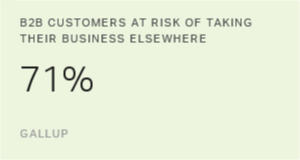Story Highlights
- The bank applied rigor and attention to associate engagement
- Leadership stressed helping managers to be better coaches
- Recognizing exemplary work is key
Alabama-based Regions Bank has seen its share of challenges in recent years. Not long after Regions and AmSouth Bancorporation merged in 2007, the global financial markets collapsed, which challenged the merged entities during the economic fallout.
But Regions actually emerged stronger from this difficult period. A pivotal factor in the bank's success: Regions' associates pulled together across business groups and locations to weather the downturn. When it ended, bank leaders realized it could be some time before market conditions proved favorable for growth.
In this challenging environment, leadership concluded that in order to grow and increase revenue in a balanced way, part of the bank's focus needed to be internal. They looked to measuring and managing engagement as a way to gain momentum. The bank launched its first associate engagement survey in July 2012. Having worked with Gallup on customer engagement in the past, the bank saw this step as a natural evolution -- to apply that same attention and rigor to engaging associates.
"The idea of associate engagement at Regions aligns with our core values as a company about how we believe in treating people. We just needed help in using the science of engagement and finding out how to best apply it and make it work for Regions," says Austin Suellentrop, vice president, organizational effectiveness, at Regions.
Reinforcing a Core Value: Putting People First
"Our team was charged with a mission: to drive associate engagement throughout the entire organization. We believed that this would allow us to meet the needs of our customers and demonstrate to our associates just how important each and every one of them is to our success. This is a fundamental element of our culture -- to put people first," says Susan Hengel, senior vice president, organizational effectiveness. "As a result of our intentional focus on engagement, associates say they are reminded that Regions cares about them as much as it cares about customers."
By having conversations about what it feels like to work for Regions, the bank experienced an impressive improvement in overall engagement. Since 2012, Regions has seen its percentage of engaged associates increase at a rate that exceeds industry benchmarks. Gallup finds that engaged employees consistently outperform their actively disengaged counterparts, so improving this ratio is crucial for the bank's growth. Indeed, Regions has found that in the branch and business banking networks, engaged associates outperform their counterparts.
Turning Managers Into Coaches
Knowing that managers play a vital role in engaging their teams, Regions also wanted to find ways to help its leaders at all levels improve. Through the engagement process, Regions discovered its managers needed to become better coaches, so in 2014 the bank added an item to Gallup's Q12 employee engagement survey: "Within the last month, my supervisor has given me helpful feedback and coaching to improve my performance."
Gallup compared overall results between 2013 and 2014 and found that managers' coaching influenced the movement of their teams between bottom and top engagement quartiles. Depending on where workgroups ranked in 2013, their scores on the coaching question in 2014 predicted their quartile results in 2014. Those who gave higher scores to the coaching item in 2014 were more likely to remain in or improve to the top quartile.
"Coaching is about helping individuals and teams achieve and sustain top performance in ways that are linked to the organization's needs and measurable business results. Effective coaching allows associates to reach places in their performance that they didn't think they were able to go. And it takes a coach with strong leadership ability to be able to do that," Hengel says.
Other factors can also affect progress. Suellentrop says he's spent time analyzing patterns in workgroup scores and how those patterns relate to performance. When examining the root cause of disengagement, he found three common factors: lack of trust, a team's structure and how a manager views his or her role. Regions provided additional support for teams to carefully track and identify which challenges could potentially drag them down.
"If we can identify potential systemic issues, we have a responsibility to work to eliminate them so that associates can continue to work together to make life better for our customers," Suellentrop says.
Offering Day-to-Day Employee Recognition
Managers of top-performing teams use recognition to keep their associates engaged. Regions' Powered By People stories and videos, for example, go behind the scenes to put associates who do exemplary work in the spotlight.
"This program reflects our culture to the public. When we use RegionsBankNews.com, @RegionsNews on Twitter and the Regions YouTube channel, we can build on what we already share in the marketplace about our company," says Loren Spiller, vice president, corporate communications.
Today, the bank employs nearly 24,000 people in 16 states. And as for continuing to improve its model of associate engagement, Regions is not focused on a score. Making life better for its associates, customers and communities is Regions' goal. Engagement, the company believes, is a means to get there.

